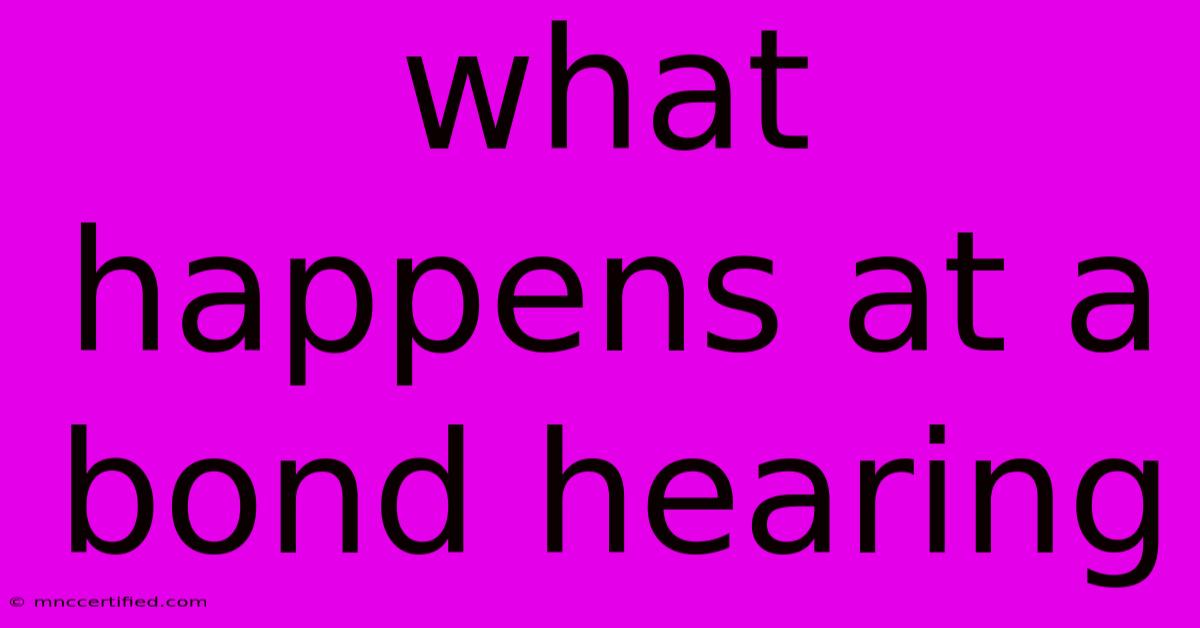What Happens At A Bond Hearing

Table of Contents
What Happens at a Bond Hearing? A Comprehensive Guide
A bond hearing, also known as a bail hearing, is a critical stage in the legal process. It determines whether an arrested individual will be released from jail before their trial and, if so, under what conditions. Understanding what happens at a bond hearing is crucial for anyone facing arrest or supporting someone who has been. This comprehensive guide will walk you through the process, explaining key terminology and procedures.
Understanding the Purpose of a Bond Hearing
The primary purpose of a bond hearing is to balance two competing interests: the public's safety and the defendant's right to pretrial liberty. The judge must consider several factors when deciding whether to grant bond and, if so, what conditions to impose. These factors can include:
- The severity of the alleged crime: More serious charges, such as murder or armed robbery, often result in higher bonds or denials of bond altogether.
- The defendant's criminal history: A history of failing to appear in court or committing violent crimes will likely lead to a higher bond or denial.
- The defendant's ties to the community: Factors like employment, family ties, and residential stability can influence the judge's decision. Strong community ties often suggest a lower risk of flight.
- The potential risk to the community: The judge assesses the risk the defendant poses to public safety if released. This is a key consideration, especially in cases involving domestic violence or other violent crimes.
The Players Involved in a Bond Hearing
Several key players participate in a bond hearing:
- The Judge: The judge presides over the hearing, listens to arguments, and makes the final decision regarding bond.
- The Prosecutor: The prosecutor represents the state and argues against the defendant's release, emphasizing the potential risks to public safety.
- The Defense Attorney: The defense attorney represents the defendant and argues for their release, highlighting their ties to the community and reasons why they pose no flight risk.
- The Defendant: The defendant is present at the hearing, although they may not speak extensively.
- Bail Bondsman (Sometimes): If the defendant uses a bail bondsman, they may be present to assist with the bonding process.
The Procedure of a Bond Hearing
While procedures can vary slightly by jurisdiction, a typical bond hearing generally follows these steps:
-
Arraignment: The defendant is formally charged with the crime(s).
-
Bond Request: The defense attorney requests a specific bond amount or argues for release on their own recognizance (ROR), meaning no monetary bond is required.
-
Prosecutor's Argument: The prosecutor presents their case against the defendant's release, highlighting reasons why a bond should be high or denied.
-
Defense Attorney's Argument: The defense attorney presents arguments in favor of the defendant's release, emphasizing factors that mitigate the risk of flight or harm to the community.
-
Judge's Decision: After considering all evidence and arguments, the judge renders a decision. This decision can include:
- Setting a bond amount: The defendant must pay this amount to be released.
- Denying bond: The defendant remains in jail until trial.
- Releasing on their own recognizance (ROR): The defendant is released without having to pay a bond, but may face conditions like regular check-ins.
- Setting conditions of release: These could include things like:
- House arrest: The defendant must remain at home except for pre-approved activities.
- Electronic monitoring: The defendant wears a tracking device.
- Curfew: The defendant must be home at certain hours.
- No contact orders: The defendant is prohibited from contacting specific individuals.
- Substance abuse testing: The defendant must undergo regular drug testing.
-
Bond Posting (If Applicable): If a bond is set, the defendant or a bondsman must post the bond amount to secure the defendant's release.
What to Do if Bond is Denied
If bond is denied, the defendant remains incarcerated until trial. The defense attorney can appeal the judge's decision, arguing for a reconsideration or presenting new evidence. This process can be lengthy and complex, requiring experienced legal counsel.
Finding Legal Assistance
Navigating the complexities of a bond hearing requires legal expertise. If you or someone you know is facing a bond hearing, seeking the advice of a qualified criminal defense attorney is crucial. They can protect your rights, advocate for your release, and guide you through the legal process.
This article provides a general overview of bond hearings. Specific procedures and laws vary by jurisdiction. Always consult with a legal professional for advice specific to your situation. Remember, understanding the process is your first step toward a fair and just outcome.

Thank you for visiting our website wich cover about What Happens At A Bond Hearing. We hope the information provided has been useful to you. Feel free to contact us if you have any questions or need further assistance. See you next time and dont miss to bookmark.
Featured Posts
-
Bond Forfeiture Traffic Ticket
Nov 26, 2024
-
West Hams Predicted Starting Xi
Nov 26, 2024
-
Celtics Vs Clippers Live Stream And Start Time
Nov 26, 2024
-
How To Obtain Fortnites Juice Wrld Skin
Nov 26, 2024
-
Bonding Teeth Before And After
Nov 26, 2024